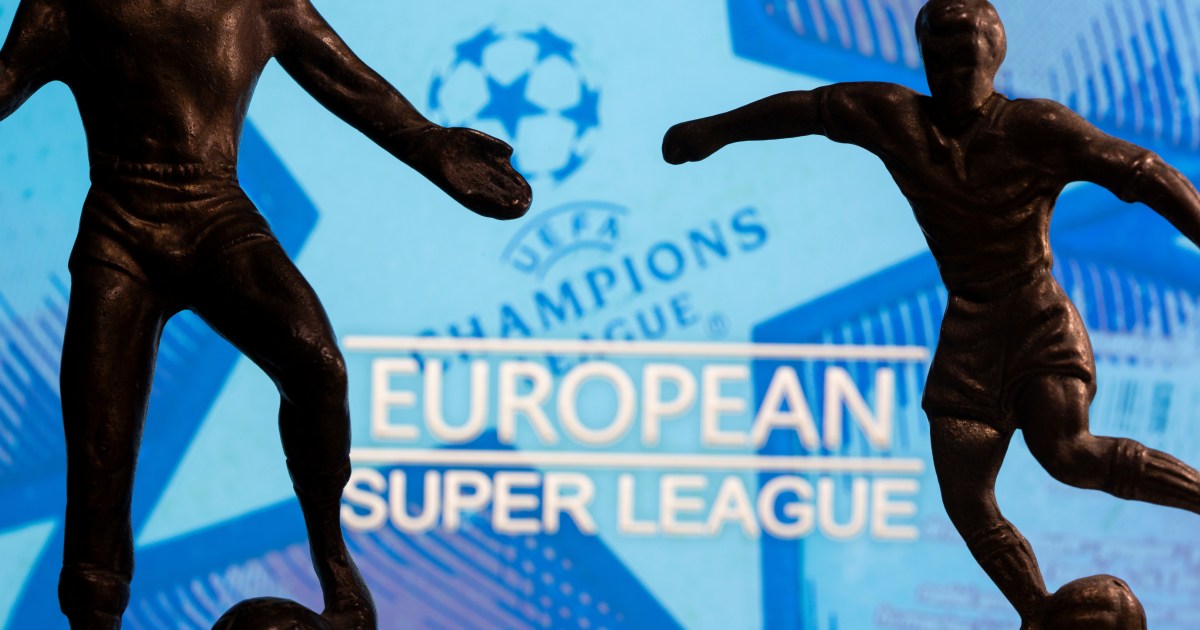The clubs that launched the European Super League face an uncertain future after their dreams of obtaining record revenues to cover the large deficit that has been exacerbated by the Corona pandemic.
A report published by the British newspaper, The Independent, stated that the European Super League, which was announced on Sunday and lasted only 3 days, will have deep and long-term repercussions on the 12 clubs and on football in general.
Although the idea of this league has existed for decades, Florentino Perez, President of Real Madrid, who was chosen to head the European Super League, said that the main reason for announcing this project at the present time is the suffocating financial crisis that clubs are going through due to the Corona pandemic.
Big losses
Accounting firm Deloitte estimates that the top 20 clubs in Europe lost more than two billion euros in revenue in the 2020/2019 and 2021/2020 seasons, with the largest share of losses incurred by the 12 clubs that founded the European Super League.
The founding statement of the European Super League stated that the 12 clubs will receive revenues estimated at 3.5 billion euros "to offset the effects of the (Covid-19) pandemic."
Media reports confirmed that the initial reward for each club that agreed to participate ranges between 200 and 300 million euros.
According to the report, the two Spanish football giants, Barcelona and Real Madrid, were among the clubs most affected by the Corona pandemic, and they were looking forward to participating in the European Super League to get out of the financial crisis.
The net debt of the Catalan club rose by a record high, amounting to 488 million euros as of last June.
Real Madrid's loan from banks tripled, amounting to 150 million euros in 12 months.
According to data compiled by the football economics website Off The Pitch, the net debt of European Super League clubs increased by 840 million euros between 2019 and 2020.
After these clubs were looking to obtain large revenues from the new competition to help them get out of the financial hardship, it seems that matters will become more complicated for the clubs withdrawing, as leaks indicate that they must pay large fines according to the contracts signed upon joining the new project.
In addition, many voices are calling on local leagues and European football structures to take tough decisions against dissident clubs, including financial penalties and relegation to lower degrees, which will double the losses.
Do club management laws change?
The report finds that in the current circumstances, it is not unlikely that some highly indebted clubs will be offered for sale, and a number of club owners may consider abandoning these troubled investments.
In the eyes of the American owners of Manchester United, Arsenal and Liverpool, the idea of establishing a closed league for European elite clubs in the American way was very attractive, as it would provide them with greater income than broadcast revenues and ensure that they would participate continuously regardless of their results locally.
The report finds that the joining of Chelsea and Manchester City to the "coup attempt" serves as a wake-up call to the fans of the two clubs, who were previously ready to overlook their concerns as long as the owner spends generously to achieve success and win titles.
This was the main motivation behind the idea put forward by the British government to grant the fans a share of the votes that the majority can afford to run clubs, or at least 51% of the shares, which is the system adopted in Germany.
It was clear that the veto power granted to fans in German clubs prevented major clubs - led by Bayern Munich, who won the Champions League last season - from joining the Super League.
Long-term gains
Regardless of the Corona crisis and its financial repercussions, European elite clubs have not been able to invest the large revenues from television rights over the past three decades, and have spent their budgets unchecked on fancy deals and salaries, and benefits for players' agents.
Figures indicate that players 'wages in England, Spain, France and Italy drain between 60% and 75% of clubs' total revenues.
Visible financial consultancy asserts that despite the huge increase in revenues over the past decade, the major English clubs have failed to make any profits at this stage, and their losses amounted to about 3.2 billion euros.
Alexander Ceferin: Everyone should draw a lesson from what happened # European Super League #Football # Ceferin pic.twitter.com/O1XkoV5oQ4
- beIN SPORTS (@beINSPORTS) April 23, 2021
UEFA has worked to counter the bleeding through what are known as fair financial play rules that seek to limit the ability of billionaires to spend on new deals without real income for clubs.
But those rules were not strictly enforced - according to the report - and that made the owners of big clubs continue to spend large sums on contracts.
Among the possible scenarios for the failure of the European Super League experience, is that the wealthy clubs will finally realize that these financial controls are in their own interest, and this may encourage local and international football authorities to strictly enforce laws.
The report concludes that the immediate impact of the collapse of the European Super League project may be painful for rebel clubs financially, but in the long run the crisis will lead to strengthening the rules of fair financial play, giving a stronger voice to the fans, and providing a more sustainable economic framework for the entire game.

